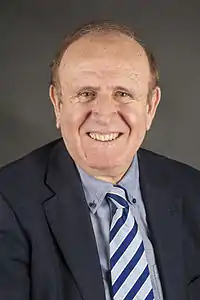Pino Arlacchi
Giuseppe Arlacchi, also known as Pino (born 21 February 1951), is an Italian sociologist and is well known worldwide for his studies and essays about the Mafia. Currently, he represents the Italian Democratic Party and is a member of the Socialists and Democrats (S&D) parliamentary group since 2010.
Giuseppe Arlacchi | |
|---|---|
 Giuseppe Arlacchi (2014) | |
| Member of the Chamber of Deputies | |
| In office 1994–1996 | |
| Member of the Senate | |
| In office 1996–2001 | |
| Member of the European Parliament for Southern Italy | |
| In office 2009–2014 | |
| Personal details | |
| Born | 21 February 1951 |
| Nationality | Italian |
| Political party | Democratic Party of the Left Italy of Values Democratic Party |
| Occupation | Sociologist |
| Website | www.pinoarlacchi.it |
On 1 September 1997 he was appointed Director-General of the United Nations Office at Vienna and Executive Director of the Office for Drug Control and Crime Prevention (ODCCP),[1] with the rank of Under-Secretary-General. Currently, he is a full professor of sociology at the University of Sassari.
Biography
He was born in Gioia Tauro, Calabria (Italy). In the early 1990s he was involved in the foundation of the Direzione Investigativa Antimafia (DIA), a law-enforcement agency specially entrusted with fighting organized crime.[1]
Later on he became president of IASOC (International Association for the Study of Organized Crime). Finally, he was appointed honorary president of the Giovanni Falcone foundation, named after noted magistrate Giovanni Falcone, who was also a close friend of his.
Academic career
He has been associate professor of applied sociology at the University of Calabria and at the University of Florence. Moreover, he was visiting professor at the Columbia University of New York City, USA. Later on, he got the full professor position at the University of Sassari, where he is currently professor of sociology in the political science faculty.
Political career
In 1994–1996 he was a member of the lower chamber of the Italian parliament and, between 1996–1997, of the Senate. During this period, he was appointed vice-president of the Antimafia Commission, a bicameral commission of the Italian Parliament to which he had already collaborated as consultant between 1984 and 1986.
Since 2009 he is a Member of the European Parliament for Southern Italy: initially with the Italy of Values (ALDE), then[2] with the Democratic Party (S&D).
United Nations activities
As soon as he was appointed director of UNDCP he started a worldwide campaign against drugs, the so-called "A Drug Free World".
The key point of such proposal was the elimination of all opium and cocaine plantations by the end of 2008, by means of the development of alternative plantations. Such a proposal had been proposed by Arlacchi immediately after his installation at the UN office and it had been unanimously approved by the UN general assembly in June 1998.
Since that time, the production of narcotic noticeably decreased, in particular in Afghanistan. Unfortunately, the new war conducted by the US against the Taliban regime interrupted the program started by Arlacchi some years before. After the beginning of the war, the production of opium restarted.
A review of the Arlacchi plan has been carried out in March 2009 by the UN Commission on Narcotic Drugs. The Political Declaration approved at the end of the review process acknowledged significant progresses and reconfirmed the whole strategy for another 10 years, until 2019.
The most important result achieved by Arlacchi during his activity at the UN was the promotion of a UN convention against all the forms of organized criminality, that has been held in Palermo in 2000. The document of this convention came into effect in 2003.
Azerbaijan election controversy
As Head of the European Parliament's monitoring team, Pino Arlacchi certified that the elections in Azerbaijan on 9 October 2013 were "free, fair and transparent" contrary to what was declared by ODIHR, Human Rights Watch and Freedom House - a difference of views that caused some controversy and drew criticism [3] [4] [5] following investigative reports published by the European Stability Initiative on “Caviar Diplomacy” used by Azerbaijan to silence its critics.[6] [7]
Arlacchi dismissed the criticism as uncivilized and fictitious and replied that his assessment of the Azerbaijani presidential elections was not personal but reflected that of sixty-five other parliamentarians belonging to three different delegations (OSCE, EP, Council of Europe), and of over one thousand observers from another 46 delegations present on site and from all over the world. [8]
Bibliography
Arlacchi is the author of several books and publications on the Mafia and transnational organized crime, which have been translated into many languages. He has received a number of national and international awards and decorations, in recognition of his outstanding contribution towards a better understanding of the Mafia. His publications include Mafia Business: The Mafia Ethic and the Spirit of Capitalism and Mafia, Peasants and Great Estates: Society in Traditional Calabria.
References
- Pino Arlacchi, United Nations Under-Secretary-General, United Nations Department of Public Information, March 2000
- (in Italian) "Parlamento Europeo: Pino Arlacchi lascia l'IDV ed aderisce al PD" from PartitoDemocratico.eu
- "La". Corriere della Sera (in Italian). 2013-11-06. Retrieved 2021-01-24.
- "Azerbaijan: Pino Arlacchi imbarazza l'Europa". Panorama (in Italian). 2013-10-28. Retrieved 2021-01-24.
- Caucaso, Osservatorio Balcani e. "Europe, Azerbaijan, and caviar". OBC Transeuropa (in Italian). Retrieved 2021-01-24.
- "Disgraced - Azerbaijan and the end of election monitoring as we know it | ESI". www.esiweb.org. Retrieved 2021-01-24.
- "Caviar Diplomacy - How Azerbaijan silenced the Council of Europe | ESI". www.esiweb.org. Retrieved 2021-01-24.
- "Pino Arlacchi - Arlacchi: "Voto azero, la divisione fra gli osservatori è normale e non ne sono io il responsabile"". www.pinoarlacchi.it. Retrieved 2021-01-24.